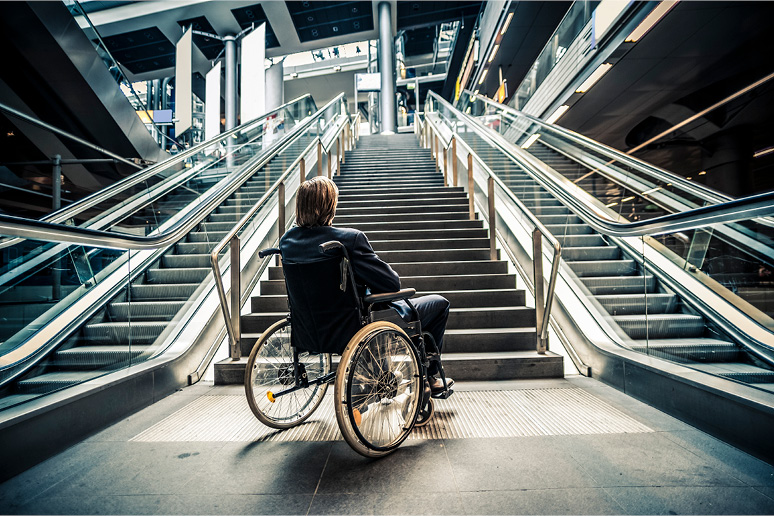The Americans with Disabilities Act (ADA) went into effect in the 1990s–and has been updated since–to offer broad protection from discrimination of people with disabilities. Under the ADA, individuals and organizations in several areas of public life cannot discriminate against you in any way and must provide reasonable accommodations for you, so long as it does not create undue hardship. This means employers (Title I), state and local government services (Title II), public accommodations and commercial facilities (Title III), telecommunication providers (Title IV), and more all need to grant you equal access and opportunities when you have a disability.
If you believe you have been discriminated against because of your disability, you should speak with an attorney about the best way to rectify the situation, and if necessary, how to file a complaint with the relevant government agency, such as the U.S. Department of Justice (DOJ) or the Equal Employment Opportunity Commission (EEOC), or a lawsuit against the other party.
What is a disability under the ADA?
The ADA considers you to have a disability if at least one of the follow factors applies to you:
- You have a physical or mental impairment that substantially limits one or more major life activities. A physical or mental condition impacts a major life activity if it impacts your breathing, hearing, walking, talking, sleeping, performing manual tasks, being able to take care of yourself, or a major bodily function, which includes respiratory function, blood circulation, reproductive function, digestive, bowels, and bladder function, and neurological and brain function.
- You have a record of such an impairment. There has been a previous record, diagnosis, or classification of a physical or mental impairment that substantially limited one or more major life activities, though you do not necessarily have that disability right now.
- You are regarded as having such an impairment. You may be regarded as having a disability if you have been subjected to an unlawful action under the ADA because an individual or entity views you as having a mental or physical impairment that is not minor or transitory. This definition of disability under the ADA does not focus on your actual physical or mental capabilities. Instead, it focuses on how another person or entity perceives and treats you.
Discrimination under the ADA
You may be a victim of discrimination under the ADA if you are:
- not given equal access to public areas and benefits
- unlawfully denied reasonable accommodations
- treated unfavorably by an employer, public transportation provider, telecommunications provider, or other individual or entity that provides public accommodations, like stores and restaurants.
“A person with a disability is entitled to reasonable accommodations if they’re required to do the essential requirements of the job,” says Steven M. Warshawsky, founder and principal of The Warshawsky Law Firm. Reasonable accommodations are your right under the ADA, but in the workplace, you are the one who has to make the need for that accommodation known. “The employee has an affirmative obligation to reach out to the employer, to advise the employer about the need for the accommodation, and to engage in what’s called the ‘interactive process,’ which is basically just a fancy term for the employer and the employee talking about what kind of accommodation is necessary and feasible under the circumstances.”
Disability discrimination may be explicit. For example, if you have a medical condition that requires you to become a wheelchair user, and your employer lets you go instead of providing reasonable accommodations to enable you to come into work and do your job, this may be discrimination under the ADA. It depends on whether making alterations creates an undue hardship or not. If your employer would need to move some equipment or furniture or purchase you a new desk, this is unlikely undue hardship. If your employer’s building is not accessible, and it cannot provide you with an appropriate work space without moving, this may be an undue hardship.
Discrimination may be less obvious. For example, you became a wheelchair user and your employer made accommodations. However, you feel like you never hear the end of it. Your manager makes snide comments about you receiving special treatment. Coworkers make fun of your wheel chair, your physical limitations, and where you can go. The remarks, comments, and inappropriate jokes continue for months, creating an uncomfortable and unproductive environment. This is harassment that violates the ADA.
Discrimination outside the workplace
Discrimination regarding disabilities often occurs at work, however the ADA also encompasses other areas of life. You may be discriminated against by public entities and private businesses. For instance, if you have HIV/AIDS or are known to be friends with individuals with the condition, and a business refuses to serve you because of this, that business is violating the ADA.
Additionally, in recent years, there has been a great deal of controversy regarding whether websites are public accommodations. The ADA, even after revisions, does not specifically include websites. However, many courts have extended the statute to cover websites since the law is intended to allow people with disabilities to participate in mainstream society and Congress has stated that the law should keep up with evolving technology.
If you believe you have been discriminated against because of a disability, at work or outside of work, then you need to speak with a lawyer regarding your rights under the ADA. The unfavorable treatment you experience may amount to discrimination, and you may have an administrative or legal claim against the other responsible individual, business, or government entity.
Filing an ADA complaint
If you have suffered discrimination due to a disability, you may have the right to file an administrative complaint with a state or federal agency. If you were discriminated against at work, you may file a complaint with the EEOC. If the discrimination is related to your housing, then you may file a complaint with the U.S. Department of Housing & Urban Development (HUD). If you suffered discrimination while flying, you may file a complaint with the U.S. Department of Transportation (DOT). If you were discriminated against by a local or state government, a public accommodation, or a private business, you may file an ADA complaint with the DOJ.
When filing a complaint with the EEOC, it’s crucial to be aware of—and in compliance with—strict deadlines. “In order to pursue a legal claim under the ADA, an employee has to file a complaint with the EEOC, and that’s either within 180 days or 300 days of the termination, and the difference depends on where you live and whether the state also has an equal employment opportunity agency,” Warshawsky says. “You definitely need to be aware of the deadlines because, from a legal perspective, the employee’s leverage—the attorney’s leverage—is all predicated on their ability to use the law. So, if you miss deadlines, you lose your ability to assert a claim.”
If your situation is not rectified through an administrative complaint, you may have the right to file a lawsuit. You should speak with an experienced local attorney who handles ADA discrimination about your options and the best course of action.
 By Victoria Langley,
By Victoria Langley, 

